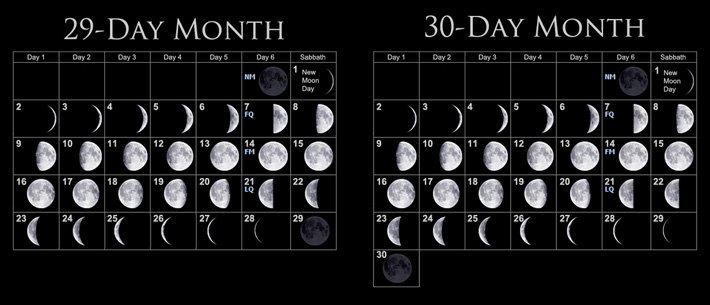As we have discussed in the post, It’s the time, stupid, Pharaoh never got the message that it’s all about mastery of time. To make sure Jews did get this message, G‑d gave them the very first commandment—the commandment of keeping time, of marking new months:
This month shall be unto you the beginning of months; it shall be the first month of the year to you.(Ex. 12: 2)
It is important to note that Jews were not only commanded to keep time, they were commanded to “make” time. Indeed, in Biblical times, the new month was not calculated according to a calendar, as it is done today, it was proclaimed by a Bet Din (an ecclesiastic court) based on the testimony of two live witnesses, who observed the new moon.
Because a lunar month is roughly 29.5 days (more precisely, a synodic month is 29 days, 12 hours, 44 minutes and 3 seconds), a new moon can be observed a day earlier, or a day later. Thus the 30th day of each month was in limbo. If the new moon was not seen on this day by witnesses, this day would be the last day of the month. If, on the other hand, live witnesses observed the new moon and the Bet Din (the Supreme Court) proclaimed the new month, this day would be the first day of the next month—a day, called Rosh Chodesh (“the head of the month in Heb).
Using the language of quantum mechanics (and taking a poetic license), we can say that the 30th day is in a state of superposition of two states: the last day of the previous month or the first day of the next month. (By way of disclaimer, strictly speaking, this has little to do with the quantum mechanical superposition. I use this terminology metaphorically extrapolating the notion of mixed states from physics into another conceptual domain.) Just as in quantum mechanics, it takes an observer to collapse the wavefunction, in Judaism, it also takes an observer (two, in fact) to collapse the “wavefunction,” as it were, of the day that is in a state of “superposition,” after which the High Court determines its state as the last (30th) day of the present month or the first day of the new month. Thus, Jews have been empowered to “make time,” i.e., to determine the calendar. All holidays falling in that month depend on the determination of the Rosh Chodesh (the New Moon) by the Bet Din.
There is an important difference in the way we bless Shabbat, on the one hand, and Rosh Chodesh and Holidays, on the other hand. Blessing Shabbat we say, “Blessed art thou Lord, who sanctified the Shabbat” (“Mikadesh HaShabbat”). On the other hand, during the additional (“musaf“) prayer of Rosh Chodesh, we say, “Blessed art thou Lord, who sanctified Israel and New Moons” (“Mikadesh Yisrael veRoshei Chadoshim”). Similarly, for the holidays we say, “Blessed art thou Lord, who sanctified Israel and the Appointed Times (i.e., Holidays)” (“Mikadesh Yisrael veHazmanim”). The difference is that in the blessing for Shabbat, Israel is not mentioned. Counting weeks or counting Sabbaths is not dependent on the spiritual service of the Jewish people. It has to do with the creation of the world by G‑d. That is why Israel is not mentioned in the benediction. Counting months, however, as well as determining Appointed Times, Holidays, depends on the service of the Jews, who are empowered to “collapse the wavefunction,” as it were, of the months to determine the beginning of the new months and consequently, the days, on which Holidays fall during that month (and sometimes, the next, as in the case of Shavuot, which always falls on the 50th day from the second day of the Passover).
Jews are commanded to count days (from Shabbat to Shabbat), weeks, (from the Passover to Shavuot), months (Roshei Chadashim), years (from one Sabbatical years to another—Shmita), seven-year Sabbatical cycles, Shmitas ( from one Jubilee, Yovel, to the next). The purpose of counting days is to make the days count!
The word “ZeMaN” (time) is made of three letters—Zayin, Mem, and Nun. This word was seen by the Kabbalists as the acronym of Zeman (time), Makom (space) and Nefesh (soul or holiness). Linguistically speaking, it’s all included in time. We live in time. The very space we live in is in time. The holiness is in time.
Holiness is not an abstract idea. Holiness is a hidden potential within each moment of time—a potential to make the world a better place—Tikun Olam. Realizing this potential is what reveals the holiness of the moment. A missed opportunity is missed forever, because that moment in time will never return, and the potential that could have been revealed in that moment is gone with that moment. There will be other moments filled with other opportunities, but the missed moment with its unrealized potential is missed forever.
One Jew, who began laying tefilin (phylacteries) late in life, began putting them on twice a day. When asked why he was doing this, he explained that he missed many days since his Bar Mitzvah, when he was supposed to be putting on tefilin but did not. So he decided to make up for lost time by putting them on twice a day. Good intention, no doubt, but unfortunately, it does not work. The days that are gone cannot be returned. Nor can we recover the potential to perform a commandment or do a good did, a “mitzvah,” to actualize the potential goodness that those days contained. The Roman poet, Horace (Quintus Horatius Flaccus, 65 BCE – 8 BCE), wrote in his Odes “Carpe Diem”—seize the day! Understanding that each day—indeed, each moment—is unique, gives this expression a deeper meaning. We must seize each day, each hour—we must seize each moment of our lives!
Certain special moments in time, special days, called HaZmanim—the Appointed Times, i.e., Holidays—call for special actions to help reveal the holiness embedded in these days. Thus, this Torah portion, Bo (Ex. 10:1-13:16), commands Jews to reveal the holiness of the Passover (Pesach) by bringing Passover sacrifice and eating matzah, to reveal the holiness of Sukkot by sitting in the sukkah-booths. We reveal the holiness of Rosh HaShanah by blowing the shofar, etc. But every ordinary day, each moment, we can reveal the holiness of that moment by doing something good, giving charity, helping another person, or doing a mizvah (a Divine precept).
Let’s make our days and moments count — carpe diem!


